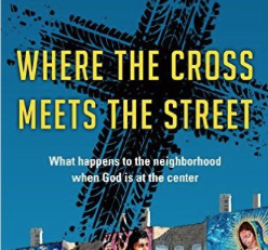One thing is for sure: Robert Lupton is a master story teller. Taking license from the ancient tradition of midrash, a Jewish teaching method to dramatize Biblical accounts, Lupton turned the narrative of Nehemiah into a contemporary story in his book Renewing the City. Though not modernizing it by putting it into a 21st century context, Lupton’s flair for drama and his understanding of urban politics and economics makes the story real and alive as if it happened just recently. The first half of the book is taken up by the retelling of Nehemiah’s story. The second part highlights various problems Nehemiah faced, also told in contemporary style, while drawing extensively from Lupton’s experience to communicate the “lessons learned” to the reader. For pastors who consider doing a sermon series on Nehemiah, this book is a must read!
Lupton writes from 30 years of experience in community development work in the city of Atlanta, Georgia, in the USA. It is this expertise, of dealing with hardships, bureaucracies, conflicts, and successes, which allows Lupton to put himself in Nehemiah’s shoes. The author recounts the story of the renovation of a prison from the Civil War era into a modern shelter for homeless families. The $3,000 cash on hand turned into a $3.2 million project headed up by the most prestigious property developers, engineers, and architects working pro-bono in partnership. Renny Scott, an Episcopal priest from the neighborhood, played the role of Nehemiah in this project, being the first to suggest such an audacious vision to seven architects from competing design firms. It makes the reader want to keep an eye out for abandoned structures in hope for a similar divine inspiration.
Urban renewal is more than turning over condemned properties. Turning around lives condemned by society is a much harder feat that requires personal sacrifice. The best thing a Christian can do, if this were to be his interest, is to move into the ‘hood and start building relationships with neighbors and institutions. Still, that in itself is not quite enough, as one commuter church discovered after moving 250 of its members to the actual community. A paradigm shift in thought and belief is required, one that moves Christians from thinking evangelism and church growth to Kingdom and societal transformation. Lupton writes:
These were suburban Christians, born and bred in individualism, who had brought with them into the city a church-centric theology of personal salvation and corporate worship. Ministry to the poor—ministry to anyone—was evangelism driven. A vision for the rebirth of a community could only be understood through the lens of saving souls and adding to the church rolls. The reclaiming of dangerous streets, the regeneration of fallen systems, the transformation of corrupted political power—these aspects of God’s redeeming work in the world that had somehow been omitted from their biblical teaching. (Lupton 2005)
Books such as Renewing the City are truly inspiring to me on one hand, yet an exercise of frustration on the other. How do I, as an expatriate in the capital of Vietnam, accomplish any of the things Lupton describes? The challenges here are much different from that of urban America. Though suburban Christians might be considered foreigners in their own inner cities, a white westerner cannot just move into a poor Hanoi neighborhood and start revitalizing societal systems. (Or can he? It has yet to be tried!) However, as a foreign Christian I can encourage and support the local believers who do and will consider it. There are many roles in the story of Nehemiah, and certainly there is one for me to play. Therefore, I will be on the lookout for the Vietnamese versions of Nehemiah and, when I meet him or her, be like an Ezra in support of them—a pastor who in Nehemiah’s actual account is hardly mentioned at all.
By Jacob Bloemberg




